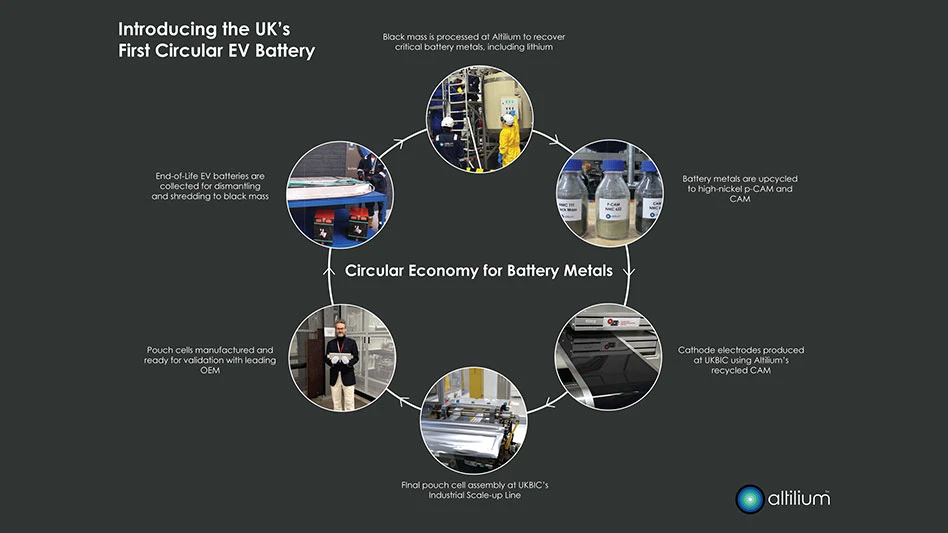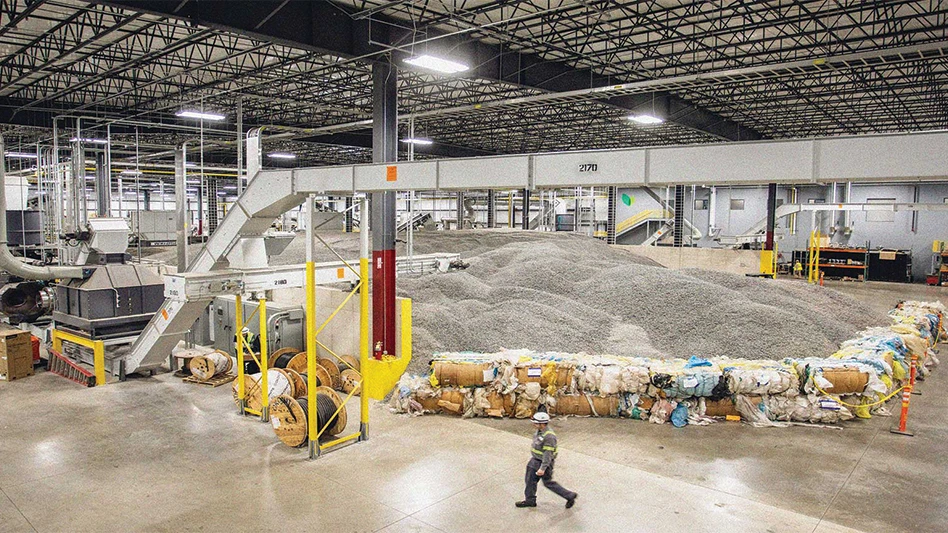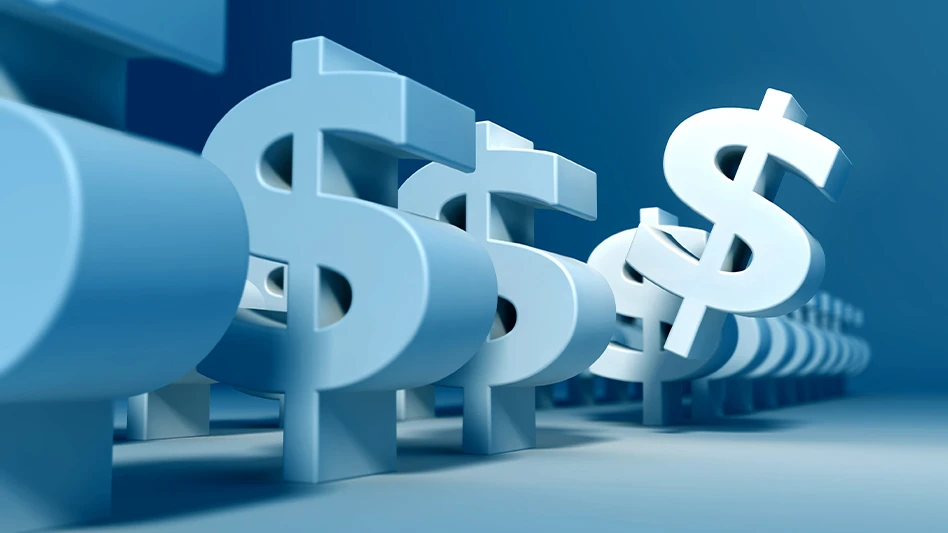_fmt.png)
According to statistics from the United Nations Environment Programme, 1 million plastic bottles are purchased every minute worldwide, and up to 5 trillion single-use plastic bags are used every year. These bottles and bags are part of the more than 330 million tons of plastic waste that are generated globally each year.
When not recycled by consumers, these end-of-life plastics can be sent to landfills or discarded as litter, potentially making their way into the world’s oceans, where they could be consumed by wildlife or collect in floating islands such as the Great Pacific Garbage Patch.
Single-use packages, such as water and soda bottles, use roughly half of the plastic produced each year. Polyethylene terephthalate (PET) is a popular choice for these applications because it is strong but also lightweight, resistant to water and shatterproof. PET is more easily recycled using mechanical techniques than some other plastics because most municipalities have programs in place to collect it. Also, it is resistant to water and food residues and to detergents used in the washing process. However, recycled PET (rPET) has less value than virgin PET. This is because it can lose some of its desirable properties during the recycling process. This loss of value is described as downcycling.
_fmt.png)
Although technology for recycling PET has advanced and rPET is being used to make food-contact packaging, downcycling still limits the types of products rPET can be used in. Some uses for rPET include more single-use bottles, containers and packaging, as well as carpet and fiber. Additionally, PET can only be recycled once or twice before the material is no longer usable and is sent to the waste stream.
Upcycling, on the other hand, can turn materials such as single-use PET packaging into a product of higher quality than the original. Upcycling technology can transform a plastic with limited applications and a brief useful life into a different, more-durable resin with expanded potential uses and an extended life cycle. In this way, upcycling can help strengthen the circular economy and can help reduce the impact of single-use plastic products on the environment.
Upcycling to drive market demand
In 2017, only about 29 percent of PET bottles were collected for recycling in the United States, according to a report from the National Association for PET Container Resources, based in Charlotte, North Carolina, and the Association of Plastic Recyclers, Washington, titled “Report on Postconsumer PET Container Recycling Activity in 2017.” That same year, the average PET bottle recovery rate in Europe was 58 percent, according to the “2017 Survey on European PET Recycle Industry” produced by Petcore Europe, Brussels.
Lower virgin resin pricing is inhibiting rPET use. However, increasing consumer demand for sustainable packaging is encouraging the trend toward using rPET.
Innovative upcycling technology can transform a plastic with limited applications and a brief useful life into a different, more-durable resin with expanded potential uses and an extended life cycle.
One way to drive greater demand for rPET is by increasing its value, which can provide an economic incentive to divert it from the waste stream. The industry is exploring upcycling to boost the desirability of rPET and to develop new ways to use postconsumer material to create more sustainable plastics.
One experimental process for upcycling PET involves incorporating plant biomass to add fiber and create composite materials. Scientists at the U.S. Department of Energy’s National Renewable Energy Laboratory, which has offices in Golden, Colorado, and Washington, combined reclaimed PET and sustainably sourced, bio-based molecules to produce two types of fiber-reinforced plastics that potentially could be used for applications that include wind turbine blades and surfboards.
However, this research effort could be a long way from commercialization. Practical upcycling solutions are needed today to help increase the economic value of rPET and to create strong demand that can help stem the tide of consumer-discarded plastic. Major resin suppliers with extensive R&D capabilities can play a leading role here.
Leveraging its materials expertise, SABIC, headquartered in Riyadh, Saudi Arabia, has taken the initiative by commercializing a new portfolio of upcycled polybutylene terephthalate (PBT) compounds and blended materials derived from rPET, primarily postconsumer water bottles. SABIC’s LNP Elcrin iQ technology addresses some of the limitations of mechanical recycling by using chemical processes to depolymerize PET bottles into their precursor chemicals, purify them and use them to create PBT resin. Each kilogram of this PBT resin uses 67 postconsumer half-liter PET water bottles.
By displacing the virgin raw materials used to manufacture PBT, LNP Elcrin iQ resin has been shown through peer-reviewed life-cycle assessment to reduce the energy and carbon footprints of the material by up to 57 percent and 49 percent, respectively.
Delivering better properties than PET
The inaugural LNP Elcrin iQ resin portfolio comprises a broad offering of compounded products, including mineral- and glass-fiber-reinforced grades. The resins in this portfolio can deliver performance and processing benefits that include good chemical resistance, colorability, high flow for faster throughput and flame retardance, including nonhalogenated formulations. Compliance with U.S. Food and Drug Administration food-contact regulations also is possible using these products. Product datasheets and samples are available from SABIC.
_fmt.png)
These new polymers can be made into durable internal and aesthetic components for consumer electronics, automotive connectors and housings for medical devices. Such applications can extend the useful life of the original, single-use PET resin.
LNP Elcrin iQ PBT resin is a drop-in solution for virgin PBT and other conventional PBT materials, making it easier for manufacturers to make their products more sustainable. Compared with virgin resin, it has a smaller “cradle-to-gate” environmental footprint, as measured by cumulative energy demand and global warming potential. By displacing the virgin raw materials used to manufacture PBT, LNP Elcrin iQ resin has been shown through a peer-reviewed life-cycle assessment to reduce the energy and carbon footprints of the material by up to 57 percent and 49 percent, respectively. The original peer-reviewed life-cycle assessment study was completed by SABIC in 2011. The results are being reviewed and updated based on current models, with expected completion and peer-review in 2019.
Reducing plastic waste
Jan. 16, a global alliance of 25 companies from across the plastics value chain launched a nonprofit organization, the Alliance to End Plastic Waste (AEPW). Its mission is to eliminate plastic waste in the environment, especially in the oceans.
One of the AEPW’s answers to this issue is innovation to advance and scale new technologies that minimize waste, make recovering and recycling plastics easier and create value from all postuse plastics. Increasing the value of rPET through upcycling supports this objective.
SABIC and the other founding members of the AEPW have pledged $1.5 billion over five years to fund efforts to enable a circular economy that encompasses reuse, remanufacturing, recycling/upcycling, redistribution and sharing of resources, with minimal leakage to landfills and the oceans.
Reducing plastic waste in the environment is a complex challenge that calls for multiple approaches, from incentivizing recycling to finding new ways to extend the life of single-use packaging materials. The process of upcycling reclaimed resins for use in higher performance applications instead of downcycling could help further these objectives.
As one of the most widely used and most easily recycled plastics, single-use PET is a potential target for upcycling efforts. SABIC’s new PBT portfolio is part of the plastic industry’s efforts to help strengthen the circular economy and help improve the health of our environment.

Explore the Fall 2019 Plastics Recycling Issue
Check out more from this issue and find your next story to read.
Latest from Recycling Today
- Returpack reports increased DRS activity in Sweden
- Trade groups align against European export restrictions
- Construction, auto sectors show mixed signals
- Politics in Turkey threaten recycled steel outlet
- Toppoint Holdings expands chassis fleet
- Lego creates miniature tire recycling market
- Lux Research webinar examines chemical recycling timetables
- Plastics producer tracks pulse of wire recycling market





